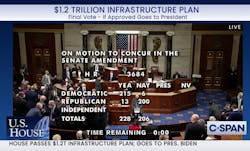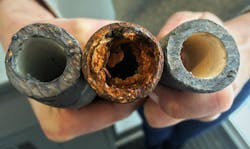BOOSTER SHOT: Bipartisan Infrastructure Bill a Reality, At Last
On Aug. 11, when a $1.2-trillion federal infrastructure bill cleared the U.S. Senate by a bipartisan vote of 69-30, the fate of the long-overdue and vitally necessary legislation did not seriously seem to be in doubt.
But then politics intervened and weeks of legislative brinkmanship between factions metastasized into bitter acrimony over the fate of parallel bills aimed at bolstering the social safety net apart from the nation's physical infrastructure. On Nov. 5, late nights of intense political horse-trading and deal-making finally brought the grand infrastructure bill to a 10 pm vote, where it passed 228-206.
The legislation will be signed by President Biden at a bipartisan White House ceremony next week. On Nov. 6, he held a press conference to express joy and thanks for the passage of legislation that had been delayed for years by partisan rancor.
"Finally, 'Infrastructure Week'", said a gleeful and relieved Biden. "I'm so happy to say that. It's Infrastructure Week... (We) will see the effects of this bill probably starting within the next two to three months as we get things moving, shovels in the ground and people being told they're gonna be working. Things are going to move."
- See below for the White House Fact Sheet, detailing specifically what's in the new legislation.
Industry reaction was similarly relieved and joyful. Immediately after the Nov. 5 vote, Linda Bauer Darr, CEO of the American Council of Engineering Companies (ACEC), tweeted: "HALLELUJAH!!! We have a bill! Great job to everyone who pushed all these years for the need to invest in America’s infrastructure! Great news for our nation. ACEC Nation -thanks to everyone of our citizen lobbyists who pushed this for years. Lets start designing the future!"
On Nov. 6, ACEC also released this statement:
Last week, the leaders of America’s engineering firms gathered for our annual Fall Conference. During the week-long event, one topic dominated the discussion: When will Congress act on the Infrastructure Investment and Jobs Act?
Today, we finally have an answer. The House approved a historic bipartisan investment in American infrastructure – an investment that will move this country into the future. Americans everywhere deserve safe drinking water, secure and efficient energy sources, and reliable bridges and roads that are resilient against today’s cyber, extreme weather, and climate challenges. America’s engineering firms take these goals and turn aspiration into reality. This bill will provide the funding necessary to improve lives today and unlock our potential for a brighter tomorrow.
##########
The American Society of Civil Engineers (ASCE) has famously been publishing an Infrastructure Report Card every four years since 1998. ASCE President Dennis D. Truax, P.E., credited his group’s efforts for finally prevailing:
It is a great day for the nation as the U.S. House of Representatives passed the Infrastructure Investment and Jobs Act (IIJA), fulfilling President Biden’s vision with a historic piece of legislation that will have monumental impacts on the economy, public safety, global competitiveness, and each American’s well-being. Passage of this five-year, $1.2 trillion bill proves once again that the country can lead with infrastructure.
With this legislation, the federal government will restore their critical partnership with cities and states to modernize our nation’s roads, bridges, transit systems, drinking water pipes, school facilities, broadband, ports, airports and more. Without a strong federal partner, local projects that are community lifelines have hung in the balance, oftentimes being paused or outright cancelled due to funding uncertainties. When this happens, American households and businesses are the ones who pay the price.
This is the culmination of decades of advocacy by ASCE members who worked tirelessly to educate Congress about the role infrastructure plays in supporting the economy and our quality of life. ASCE’s Infrastructure Report Cards have sounded the alarm on our nation’s infrastructure conditions since 1998, with new reports being released every four years. While all categories of infrastructure have been the cause of some concerns, the common denominator behind each category’s struggles has been a backlog of projects, overdue maintenance, and a need for resilience. This bill includes investments to repair and modernize these critical assets for almost all of the 17 categories in the 2021 Report Card for America’s Infrastructure, which assigned our nation’s infrastructure a cumulative grade of ‘C-‘.
We commend the House for joining the Senate in prioritizing American communities by passing this bipartisan infrastructure legislation and we are encouraged that President Biden has indicated he will sign the bill quickly to ensure our communities receive these long-awaited resources soon, allowing critical projects to move forward.
##########
Representing more than 27,000 member firms, Associated General Contractors of America (AGC) CEO Stephen Sandherr said:
The reason the Bipartisan Infrastructure Bill passed in the House is because a majority of Representatives understand that this measure will provide significant, tangible improvements to their lives of the constituents and the success of their local employers. That is because the bill provides the kind of funding needed to modernize the country’s aging and overburdened infrastructure. The legislation also maintains the policy of One Federal Decision, cutting the amount of time needed for federal reviews of infrastructure projects.
Because of today’s vote, state and local officials will be able to invest in a more efficient supply chain network. They will also be able to improve roads and bridges to make them safer and more reliable. Metro areas will be able to better maintain and expand transit systems. And water authorities will be able to further safeguard the quality of local drinking water, among other improvements funded by this bill. The measure also provides needed investments to make infrastructure more resilient to extreme weather events.
##########
Speaking for the 21,000-member 'merit shop' group, Associated Builders and Contractors (ABC), CEO Michael Bellaman added:
Passage of the bipartisan infrastructure bill creates an opportunity to effectively modernize our nation’s most critical infrastructure, and ABC and our members stand ready to do the important work to bring America’s infrastructure into the 21st century. However, ABC remains wary of some of the bill’s exclusionary provisions and statements from the Biden administration that could restrict the eligibility of America’s workers to compete for and participate in these construction projects.
##########
White House Fact Sheet: The Bipartisan Infrastructure Deal
WASHINGTON DC, NOVEMBER 5, 2021 -- Today, Congress passed the Bipartisan Infrastructure Deal (Infrastructure Investment and Jobs Act), a once-in-a-generation investment in our nation’s infrastructure and competitiveness. For far too long, Washington policymakers have celebrated “infrastructure week” without ever agreeing to build infrastructure. The President promised to work across the aisle to deliver results and rebuild our crumbling infrastructure. After the President put forward his plan to do exactly that and then negotiated a deal with Members of Congress from both parties, this historic legislation is moving to his desk for signature.
This Bipartisan Infrastructure Deal will rebuild America’s roads, bridges and rails, expand access to clean drinking water, ensure every American has access to high-speed internet, tackle the climate crisis, advance environmental justice, and invest in communities that have too often been left behind. The legislation will help ease inflationary pressures and strengthen supply chains by making long overdue improvements for our nation’s ports, airports, rail, and roads. It will drive the creation of good-paying union jobs and grow the economy sustainably and equitably so that everyone gets ahead for decades to come. Combined with the President’s Build Back Framework, it will add on average 1.5 million jobs per year for the next 10 years.This historic legislation will:
Deliver clean water to all American families and eliminate the nation’s lead service lines. Currently, up to 10 million American households and 400,000 schools and child care centers lack safe drinking water. The Bipartisan Infrastructure Deal will invest $55 billion to expand access to clean drinking water for households, businesses, schools, and child care centers all across the country. From rural towns to struggling cities, the legislation will invest in water infrastructure and eliminate lead service pipes, including in Tribal Nations and disadvantaged communities that need it most.
Ensure every American has access to reliable high-speed internet. Broadband internet is necessary for Americans to do their jobs, to participate equally in school learning, health care, and to stay connected. Yet, by one definition, more than 30 million Americans live in areas where there is no broadband infrastructure that provides minimally acceptable speeds – a particular problem in rural communities throughout the country. And, according to the latest OECD data, among 35 countries studied, the United States has the second highest broadband costs. The Bipartisan Infrastructure Deal will deliver $65 billion to help ensure that every American has access to reliable high-speed internet through a historic investment in broadband infrastructure deployment. The legislation will also help lower prices for internet service and help close the digital divide, so that more Americans can afford internet access.
Repair and rebuild our roads and bridges with a focus on climate change mitigation, resilience, equity, and safety for all users. In the United States, 1 in 5 miles of highways and major roads, and 45,000 bridges, are in poor condition. The legislation will reauthorize surface transportation programs for five years and invest $110 billion in additional funding to repair our roads and bridges and support major, transformational projects. The Bipartisan Infrastructure Deal makes the single largest investment in repairing and reconstructing our nation’s bridges since the construction of the interstate highway system. It will rebuild the most economically significant bridges in the country as well as thousands of smaller bridges. The legislation also includes the first ever Safe Streets and Roads for All program to support projects to reduce traffic fatalities, which claimed more than 20,000 lives in the first half of 2021.
Improve transportation options for millions of Americans and reduce greenhouse emissions through the largest investment in public transit in U.S. history. America’s public transit infrastructure is inadequate – with a multibillion-dollar repair backlog, representing more than 24,000 buses, 5,000 rail cars, 200 stations, and thousands of miles of track, signals, and power systems in need of replacement. Communities of color are twice as likely to take public transportation and many of these communities lack sufficient public transit options. The transportation sector in the United States is now the largest single source of greenhouse gas emissions. The legislation includes $39 billion of new investment to modernize transit, in addition to continuing the existing transit programs for five years as part of surface transportation reauthorization. In total, the new investments and reauthorization in the Bipartisan Infrastructure Deal provide $89.9 billion in guaranteed funding for public transit over the next five years — the largest Federal investment in public transit in history. The legislation will expand public transit options across every state in the country, replace thousands of deficient transit vehicles, including buses, with clean, zero emission vehicles, and improve accessibility for the elderly and people with disabilities.
Upgrade our nation’s airports and ports to strengthen our supply chains and prevent disruptions that have caused inflation. This will improve U.S. competitiveness, create more and better jobs at these hubs, and reduce emissions. Decades of neglect and underinvestment in our infrastructure have left the links in our goods movement supply chains struggling to keep up with our strong economic recovery from the pandemic. The Bipartisan Infrastructure Deal will make the fundamental changes that are long overdue for our nation’s ports and airports so this will not happen again. The United States built modern aviation, but our airports lag far behind our competitors. According to some rankings, no U.S. airports rank in the top 25 of airports worldwide. Our ports and waterways need repair and reimagination too. The legislation invests $17 billion in port infrastructure and waterways and $25 billion in airports to address repair and maintenance backlogs, reduce congestion and emissions near ports and airports, and drive electrification and other low-carbon technologies. Modern, resilient, and sustainable port, airport, and freight infrastructure will strengthen our supply chains and support U.S. competitiveness by removing bottlenecks and expediting commerce and reduce the environmental impact on neighboring communities.
Make the largest investment in passenger rail since the creation of Amtrak. U.S. passenger rail lags behind the rest of the world in reliability, speed, and coverage. China already has 22,000 miles of high-speed rail, and is planning to double that by 2035. The legislation positions rail to play a central role in our transportation and economic future, investing $66 billion in additional rail funding to eliminate the Amtrak maintenance backlog, modernize the Northeast Corridor, and bring world-class rail service to areas outside the northeast and mid-Atlantic. This is the largest investment in passenger rail since Amtrak’s creation, 50 years ago and will create safe, efficient, and climate-friendly alternatives for moving people and freight.
Build a national network of electric vehicle (EV) chargers. U.S. market share of plug-in EV sales is only one-third the size of the Chinese EV market. That needs to change. The legislation will invest $7.5 billion to build out a national network of EV chargers in the United States. This is a critical step in the President’s strategy to fight the climate crisis and it will create good U.S. manufacturing jobs. The legislation will provide funding for deployment of EV chargers along highway corridors to facilitate long-distance travel and within communities to provide convenient charging where people live, work, and shop. This investment will support the President’s goal of building a nationwide network of 500,000 EV chargers to accelerate the adoption of EVs, reduce emissions, improve air quality, and create good-paying jobs across the country.
Upgrade our power infrastructure to deliver clean, reliable energy across the country and deploy cutting-edge energy technology to achieve a zero-emissions future. According to the Department of Energy, power outages cost the U.S. economy up to $70 billion annually. The Bipartisan Infrastructure Deal’s more than $65 billion investment includes the largest investment in clean energy transmission and grid in American history. It will upgrade our power infrastructure, by building thousands of miles of new, resilient transmission lines to facilitate the expansion of renewables and clean energy, while lowering costs. And it will fund new programs to support the development, demonstration, and deployment of cutting-edge clean energy technologies to accelerate our transition to a zero-emission economy.
Make our infrastructure resilient against the impacts of climate change, cyber-attacks, and extreme weather events. Millions of Americans feel the effects of climate change each year when their roads wash out, power goes down, or schools get flooded. Last year alone, the United States faced 22 extreme weather and climate-related disaster events with losses exceeding $1 billion each – a cumulative price tag of nearly $100 billion. People of color are more likely to live in areas most vulnerable to flooding and other climate change-related weather events. The legislation makes our communities safer and our infrastructure more resilient to the impacts of climate change and cyber-attacks, with an investment of over $50 billion to protect against droughts, heat, floods and wildfires, in addition to a major investment in weatherization. The legislation is the largest investment in the resilience of physical and natural systems in American history.
Deliver the largest investment in tackling legacy pollution in American history by cleaning up Superfund and brownfield sites, reclaiming abandoned mines, and capping orphaned oil and gas wells. In thousands of rural and urban communities around the country, hundreds of thousands of former industrial and energy sites are now idle – sources of blight and pollution. Proximity to a Superfund site can lead to elevated levels of lead in children’s blood. The bill will invest $21 billion clean up Superfund and brownfield sites, reclaim abandoned mine land and cap orphaned oil and gas wells. These projects will remediate environmental harms, address the legacy pollution that harms the public health of communities, create good-paying union jobs, and advance long overdue environmental justice This investment will benefit communities of color as, it has been found that 26% of Black Americans and 29% of Hispanic Americans live within 3 miles of a Superfund site, a higher percentage than for Americans overall.
##########
About the Author
Rob McManamy
Editor in Chief
An industry reporter and editor since 1987, McManamy joined HPAC Engineering in September 2017, after three years with BuiltWorlds.com, a Chicago-based media startup focused on tech innovation in the built environment. He has been covering design and construction issues for more than 30 years, having started at Engineering News-Record (ENR) in New York, before becoming its Midwest Bureau Chief in 1990. In 1998, McManamy was named Editor-in-Chief of Design-Build magazine, where he served for four years. He subsequently worked as an editor and freelance writer for Building Design + Construction and Public Works magazines.
A native of Bronx, NY, he is a graduate of both the University of Virginia, and The John Marshall Law School in Chicago.
Contact him at [email protected].


